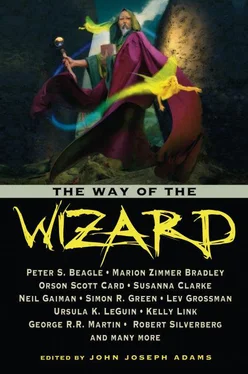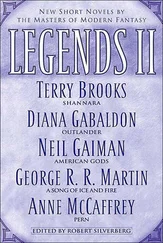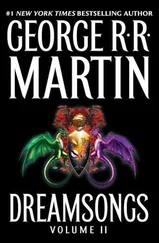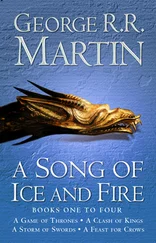Cabal looked pointedly at the constable’s hand until he removed it from Cabal’s bicep. “I mean what I say, Constable. What the hoi polloi sensationally and inaccurately call the Zombie Apocalypse , professionals such as myself refer to more soberly as the Ereshkigal Working . Nomenclature aside, the results are much the same. Humanity goes down beneath a tide of its own angry carcasses.”
Below them they could hear the sound of the building being thoroughly if violently searched by the mortuary corpses. Cabal said that these were the ones most concentrated upon by their resurrector, and that he would certainly be watching through their eyes in the periods when he wasn’t using his own through the field glasses. If they should see Cabal, the main force would be directed toward him instead of milling around the streets. Things would likely go badly for Cabal and the constable in such a case.
Thus, instead of descending to street level just yet, they climbed to the roof. “This is the plan, constable. We shall travel along this rooftop, drop to the next, go to the alleyway on its far side, descend via the fire escape… ”
“How do you know it’s got a fire escape?” interrupted the constable.
“Because I made it my business to know. It usually pays to have at least two escape routes planned; a fast one and an evasive one. This is the evasive. Now, once we reach street level, we cut across the road behind that overturned wagon. The dead are staying this side of it so far, so we had better use it before they spread out.”
“That’s insane. Why break cover that long? If we go in the other direction, we only have to cross two small alleyways.”
Cabal drew a pair of dark glasses from his breast pocket, and made a small show of polishing the blue lenses. “That route has been considered and rejected.” He put on the glasses with an air of finality.
“Rejected? But, why?” The constable scoffed incredulously. “Your route is madness. Mine is much safer, a couple of alleyways, and cut through the churchyard and… ” He paused, a thought occurring. “Do you have a problem with churches?”
Cabal’s expression was unreadable behind the glasses. Without a word, he turned and trotted off in a crouch to avoid being seen from the town hall. On reaching the end of the roof, he unhesitatingly stepped off into space. A moment later, the constable heard the crunch of sensible shoes on gravel and bitumen, and knew Cabal was safely on the next rooftop. Cursing under his breath, Constable Copeland followed.
With galling inevitability, Cabal turned out to be right about the fire escape, and the two men descended unseen to a narrow lane that opened out onto the main road. Cabal wasn’t quite so accurate on the state of the road itself, however. A lone corpse had wandered past the overturned wagon and was standing aimlessly in the middle of the way, its back to them. Once upon a time, it had been a tobacconist, but now it was just a nuisance.
“What do we do? Can you shoot it?” The constable was trying hard to think of the figure as an object, and not Mr. Billings from whom he had bought a packet of Senior Service that very morning before going on duty. He thought of the cigarettes sitting in his locker at the police station; they seemed like an artefact of a bygone civilisation now. The Apocalypse had come, and here he was, PC Copeland, a parochial plod of the local constabulary, lurking down an alley in the company of a necromancer while avoiding the attentions of an undead tobacconist.
“They’re dead, not deaf.” Cabal took the switchblade from his pocket, and snapped out the blade. He searched around in an eddy pool of litter by the base of the wall and found a bottle top. “No, this calls for subtlety.” Holding the knife so the blade was angled down, much like one might hold an ice pick, Cabal set off to demonstrate his personal definition of subtlety. Walking quietly but upright, trusting to the wagon to hide him from the main mass of walking dead, he approached the former Mr. Billings from the rear. On reaching him, Cabal paused and flipped the bottle top so it landed in front of Billings with a distinct musical ting , all glittery and eye-catching in the midday sunshine. Mr. Billings, who found the smallest things of infinite wonder ever since Mrs. Billings, about fifteen minutes earlier, had torn out his throat with her teeth, looked down at it and in so doing obligingly exposed the nape of his neck. Without the slightest hesitation, Cabal drove the knife in with an expertise that should worry any casual observer. Just as in the morgue, the spinal cord was transected between the occipital and the atlas — the strings were cut — and Mr. Billings’ body fell forward heavily to lie in the middle of the High Street on carnival day.
Cabal leaned down, and Copeland momentarily thought he was going to check that the job had been done properly, but Cabal only wiped the blade on the back of Mr. Billings’ coat before snapping it shut and dropping it back into his pocket. “Come on,” said Cabal. “And bring my bag.”
They made their way down the alleyway, across the High Street, and continued some little way down there until Cabal paused at the back door of a shop and forced his way in. It was a hardware store, which he seemed to expect, making Constable Copeland realise just how meticulous his unusual companion’s reconnaissance had been. Cabal paused to steal a coil of half-inch rope, and Copeland didn’t even bother to tut disapprovingly; things had moved beyond worrying about petty larceny. They reached the top floor where Cabal opened a locked skylight with the crowbar from his bag, and then they were on the rooftops again. They moved along a little way and then, from the shadow of a chimneystack, they observed the man on the town hall roof once again. He was still about a hundred feet away, but they could see him far more clearly now. This was not necessarily a bonus. The man wore a suit cut from the sort of tweed that weavers devise for a bet; brown lines against a yellow field, making the wearer look like an Ordnance Survey map of custard. He was a big bear of a man with a fine, Jovian beard and a collar-length mane of thick red hair of a shade too ruddy for any to call “ginger” and live.
“Are you that good a shot?” whispered Copeland.
“I’m not going to shoot him,” replied Cabal. “Worst thing I could possibly do. Despite the brutal, painful, and lingering death that this idiot so richly deserves, I have to keep him alive for the moment.”
“I don’t understand.”
“Since they don’t teach necromantic theory at the police college, I’m hardly surprised. Very well — a crash course. You will notice that the undeads’ behaviour falls into three categories. There are the very focussed examples in the morgue; these are the only ones that saw me, and so their master is keeping much of his attention on them, for the moment at least. Then there are the ones who are moving around as a flock; these are his secondaries and his attention upon them is vague. He has moved them up towards the mortuary in reserve should he still find me there. Finally, we have the vast majority, who stand around like that example in the road. They are at the edge of his awareness. He is overwhelmed by complexity here — he has far, far more subjects than he can effectively control. So, most are forgotten and are being fed no commands by the psychic links he has with the whole ugly crowd of them.”
“How are they dangerous, then?”
“Because the force that animates them is atavistic and feral. Whenever an opportunity to kill is presented to them, they slip the vague control of this nominal puppet master until the killing has been done. The force is greedy — it craves more bodies to occupy.” Cabal turned his telescope upon the man on the roof once more. “He is the means by which this animating force came into our world, and he holds its leash. That leash can never be more than a range of twenty-three tirum , an obsolete unit of measurement once used by the culture that created the Ereshkigal Working. Twenty-three equates to just under three miles. Twelve yards, seven point one six inches under, to be exact.
Читать дальше












